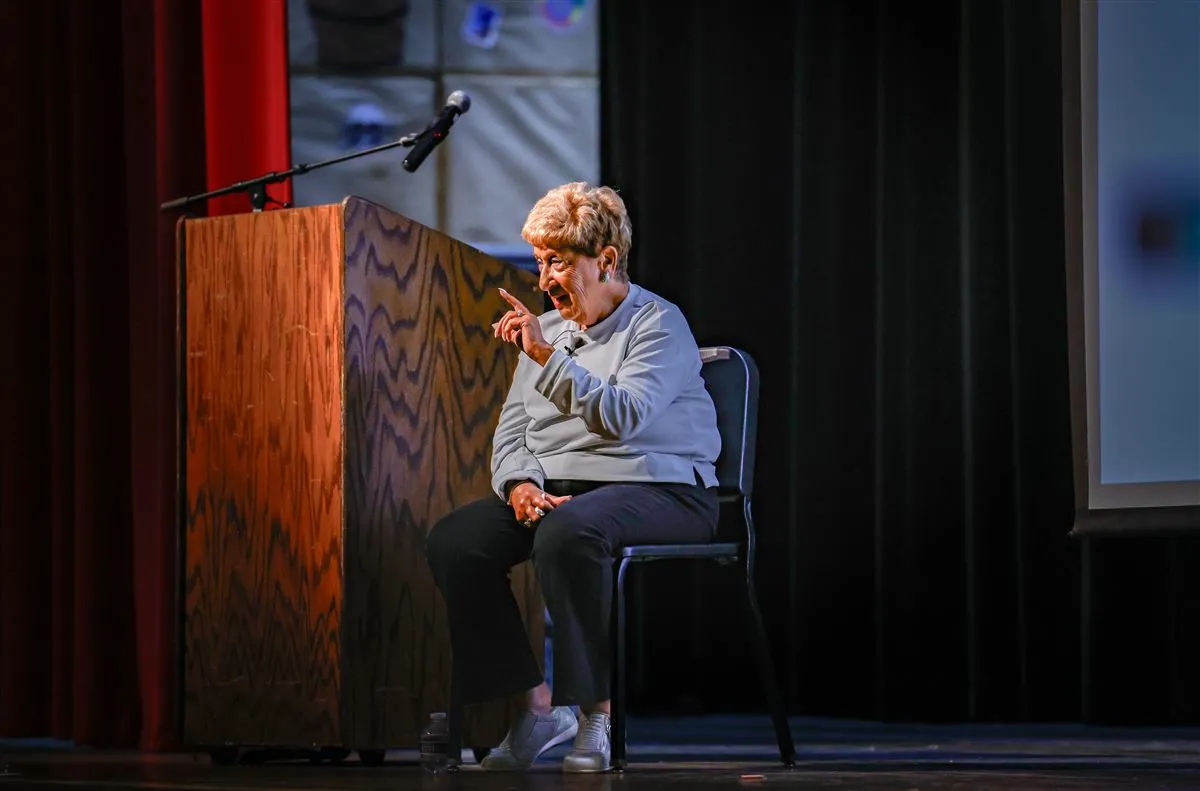Luck is a word that Rodi Glass uses frequently when she tells her story, which is apt considering the odds that she survived to sit in front of Perrysburg Junior High School students.
Mrs. Glass, 90, is one of 5,000 Jewish survivors of the Holocaust in Netherlands, and shared her story with 400 eighth-grade students Wednesday at the school, culminating their nine-week study of the events. The morning prior, she spoke in front of over 800 students at the Valentine Theatre for the Jewish Federation of Greater Toledo’s Diversity Day.
Speaking about the horrors of the Holocaust is not new for Mrs. Glass — sharing her story widely has become a focus of the latter part of her life — but recalling the memories is a way to combat the hate that nearly took her life.
“I can’t really say it’s gotten easier to speak about it, but it’s kind of cathartic to speak about it. I hope that I reach people, and that people will stop hating and people will understand what I’m trying to tell them: that they should be more tolerant of each other and like each other better.”
Mrs. Glass was born in 1936 and was just 4 years old when Germany invaded the Netherlands. She remembers sitting with her mother and father in their home and hearing the goose-stepping as troops marched down their street. After the Netherlands was occupied, restrictions on Jewish people began tightening.
“They were making our lives narrower and narrower, and we were living in a sort of prison atmosphere without being in a prison. It’s very hard for me to explain how fearful people were. I can’t explain it. I can tell you the story, but I can’t tell you the emotions, always living in fear and never knowing who’s ringing your doorbell,” she told the students.
Eventually, the Dutch police ordered her family and others to leave and loaded them on a truck and then a train, eventually arriving at Westerbork — a temporary holding place for Jews in Netherland. One of the Nazi officers there recognized her mother, whose sister he had dated, and struck their name from the list of people to be deported to a killing center.
That wasn’t the only stroke of luck that allowed Mrs. Glass and her family to survive. Their uncle had hidden money away when the Germans seized their assets and was able to buy everyone in the family documents that prevented them from being sent east to the killing camps. Those documents, at a cost of about $1 million, prevented them from being sent back to the camp when they were rounded up a second time.
However, when her family was once again rounded up during the Nazis’ third raid, they were sent to Westerbork and didn’t have an opportunity to return home. They were set to be transported to Bergen-Belsen, but because her mother’s younger sister had an English passport, they were allowed to go to an internment camp in France that was liberated by American troops about seven months later.
“We were so lucky, so lucky, because we weren’t being killed — yet. Had the war lasted longer, we would have all been sent to Auschwitz and murdered,” she said.
Her emphasis during the presentation was on the hatred that caused the deaths of six million Jewish people — not just from the people who carried out the Holocaust, but also those who stood idly by and allowed the murders. She told the students to “lead with love” and be tolerant of others.
“Leading with love makes you a better person, it makes you feel better, and you’ll be a much happier person if you lead with love. Hate will consume you, it’s an evil that makes you bitter and mean,” Mrs. Glass told the students.
Even though she tells her story frequently, Mrs. Glass wonders whether students are impacted by her message. Regardless, she continues to speak of her survival and the treatment she endured in hopes it can make a difference.
“People go home and they say, ‘I listened to this woman, and yeah [the Holocaust] was terrible,” and then go about their own way,” she said. “I’m not a powerful speaker, but I hope at least that it will resonate a little bit, and it will give them some food for thought.”
But for Natalie Miller, an eighth-grade student at Perrysburg Junior High, the opportunity to hear from a Holocaust survivor is not something she takes lightly.
“I never really thought that I would ever be able to experience listening to someone that actually went through all that,” Natalie said. “I really liked the whole ‘lead with love,’ that’s definitely something that I think not enough people actually do.”
Eighth grader Logan Conley agreed, saying he’ll remember one of Mrs. Glass’s quotes from the presentation.
“I think I can take away from it that ‘hate’s not in our DNA,’ and to use that to show more love to other people instead of expressing hate,” Logan said.

